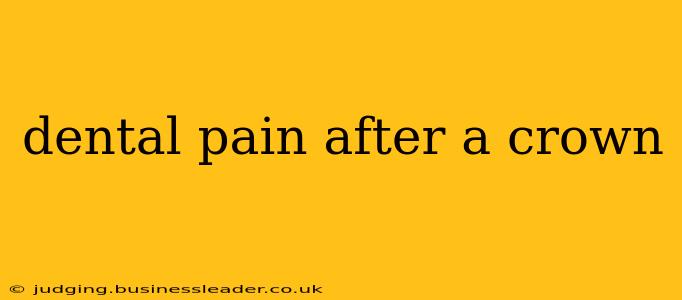Getting a dental crown is a common procedure to restore a damaged tooth, but experiencing pain afterward is unfortunately not uncommon. While some mild discomfort is expected, persistent or severe pain warrants attention. This comprehensive guide will explore the various reasons why you might experience dental pain after a crown, how to manage the pain, and steps you can take to prevent future issues.
Why Does My Tooth Hurt After Getting a Crown?
This is a very common question following crown placement. Several factors can contribute to post-crown pain:
- Irritation of the gum tissue: The crown placement process can sometimes irritate the gum tissue surrounding the tooth. This irritation can cause inflammation and tenderness, leading to pain.
- High crown: If the crown is too high, it can interfere with your bite, resulting in discomfort and pain. This is often described as a feeling that your teeth don't meet correctly.
- Sensitive tooth: Even with a crown, the underlying tooth can still be sensitive, especially to hot or cold temperatures. This sensitivity might have been present before the crown or develop afterward.
- Infection: In rare cases, an infection can develop under the crown. This is a serious complication and requires immediate professional attention. Symptoms can include severe, throbbing pain, swelling, and possibly fever.
- Underlying tooth damage: Pre-existing damage to the tooth that wasn't fully addressed before crown placement can contribute to post-procedure pain.
- Poor crown fit: A crown that doesn't fit perfectly can leave gaps allowing bacteria to enter, leading to sensitivity, pain, and potential infection.
- Temporary cement sensitivity: The temporary cement used during the initial stages of crown placement can sometimes cause temporary sensitivity or discomfort. This usually subsides once the permanent cement is used.
How Long Does Pain After a Dental Crown Last?
The duration of pain varies. Mild discomfort, such as sensitivity to temperature, might last for a few days to a couple of weeks. However, severe or persistent pain is not normal and should prompt a visit to your dentist. Pain lasting longer than two weeks or worsening should be investigated.
What Can I Do About Pain After a Dental Crown?
Over-the-counter pain relievers like ibuprofen or acetaminophen can often manage mild to moderate pain. However, it's crucial to contact your dentist if the pain persists or worsens. Do not attempt to self-treat more significant issues.
What Should I Do If I Have Severe Pain After a Crown?
Severe pain, especially accompanied by swelling, fever, or pus, indicates a potential infection and requires immediate dental attention. Contact your dentist or emergency dental service as soon as possible. Delaying treatment can lead to more significant problems.
Can I Eat After Getting a Dental Crown?
It’s generally advisable to eat soft foods for the first few days after getting a dental crown to allow the area to heal and minimize any potential irritation. Avoid extremely hot or cold foods and beverages which might exacerbate any sensitivity.
How Can I Prevent Pain After Getting a Crown?
Careful communication with your dentist is key. Discuss any concerns you have before the procedure, ensuring the dentist addresses any underlying issues affecting the tooth. Follow post-operative instructions meticulously, including maintaining good oral hygiene. Regular dental check-ups can also help prevent future problems.
When Should I See a Dentist After Getting a Crown?
Schedule a follow-up appointment with your dentist as recommended. This allows them to check the crown's fit, address any lingering issues, and ensure everything is healing properly. Don't hesitate to contact your dentist sooner if you experience significant pain, swelling, or other concerning symptoms.
Remember, seeking professional dental advice is crucial for managing any pain or discomfort after receiving a dental crown. Your dentist can accurately diagnose the cause and provide the appropriate treatment, preventing potential complications. This information is for general knowledge and does not replace professional dental care.
